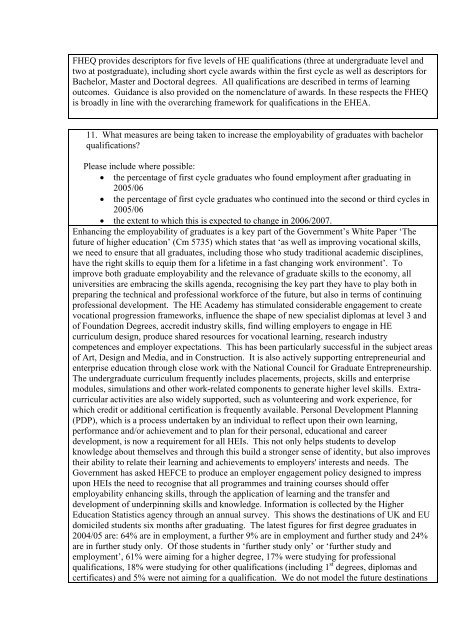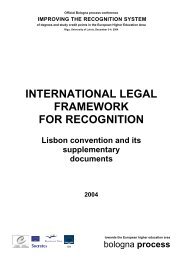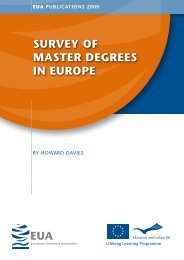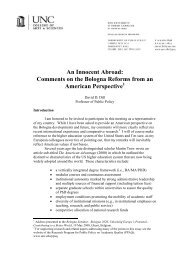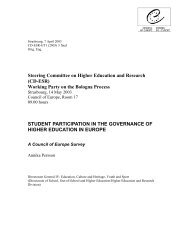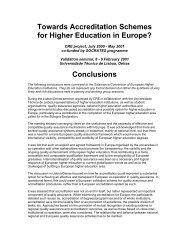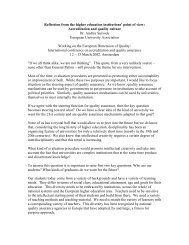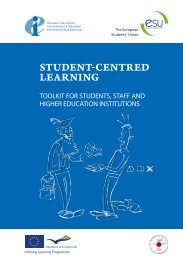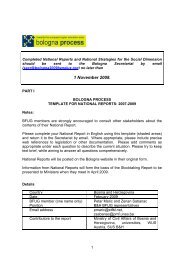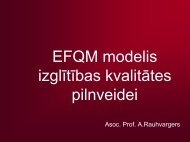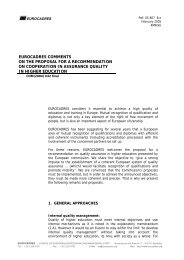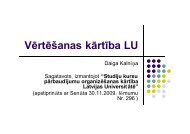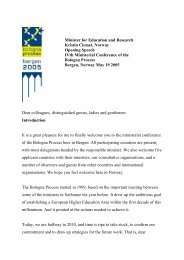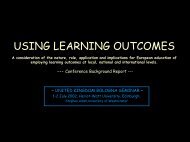BOLOGNA PROCESS - UK England, Wales & Northern Ireland
BOLOGNA PROCESS - UK England, Wales & Northern Ireland
BOLOGNA PROCESS - UK England, Wales & Northern Ireland
You also want an ePaper? Increase the reach of your titles
YUMPU automatically turns print PDFs into web optimized ePapers that Google loves.
FHEQ provides descriptors for five levels of HE qualifications (three at undergraduate level andtwo at postgraduate), including short cycle awards within the first cycle as well as descriptors forBachelor, Master and Doctoral degrees. All qualifications are described in terms of learningoutcomes. Guidance is also provided on the nomenclature of awards. In these respects the FHEQis broadly in line with the overarching framework for qualifications in the EHEA.11. What measures are being taken to increase the employability of graduates with bachelorqualifications?Please include where possible:• the percentage of first cycle graduates who found employment after graduating in2005/06• the percentage of first cycle graduates who continued into the second or third cycles in2005/06• the extent to which this is expected to change in 2006/2007.Enhancing the employability of graduates is a key part of the Government’s White Paper ‘Thefuture of higher education’ (Cm 5735) which states that ‘as well as improving vocational skills,we need to ensure that all graduates, including those who study traditional academic disciplines,have the right skills to equip them for a lifetime in a fast changing work environment’. Toimprove both graduate employability and the relevance of graduate skills to the economy, alluniversities are embracing the skills agenda, recognising the key part they have to play both inpreparing the technical and professional workforce of the future, but also in terms of continuingprofessional development. The HE Academy has stimulated considerable engagement to createvocational progression frameworks, influence the shape of new specialist diplomas at level 3 andof Foundation Degrees, accredit industry skills, find willing employers to engage in HEcurriculum design, produce shared resources for vocational learning, research industrycompetences and employer expectations. This has been particularly successful in the subject areasof Art, Design and Media, and in Construction. It is also actively supporting entrepreneurial andenterprise education through close work with the National Council for Graduate Entrepreneurship.The undergraduate curriculum frequently includes placements, projects, skills and enterprisemodules, simulations and other work-related components to generate higher level skills. Extracurricularactivities are also widely supported, such as volunteering and work experience, forwhich credit or additional certification is frequently available. Personal Development Planning(PDP), which is a process undertaken by an individual to reflect upon their own learning,performance and/or achievement and to plan for their personal, educational and careerdevelopment, is now a requirement for all HEIs. This not only helps students to developknowledge about themselves and through this build a stronger sense of identity, but also improvestheir ability to relate their learning and achievements to employers' interests and needs. TheGovernment has asked HEFCE to produce an employer engagement policy designed to impressupon HEIs the need to recognise that all programmes and training courses should offeremployability enhancing skills, through the application of learning and the transfer anddevelopment of underpinning skills and knowledge. Information is collected by the HigherEducation Statistics agency through an annual survey. This shows the destinations of <strong>UK</strong> and EUdomiciled students six months after graduating. The latest figures for first degree graduates in2004/05 are: 64% are in employment, a further 9% are in employment and further study and 24%are in further study only. Of those students in ‘further study only’ or ‘further study andemployment’, 61% were aiming for a higher degree, 17% were studying for professionalqualifications, 18% were studying for other qualifications (including 1 st degrees, diplomas andcertificates) and 5% were not aiming for a qualification. We do not model the future destinations


